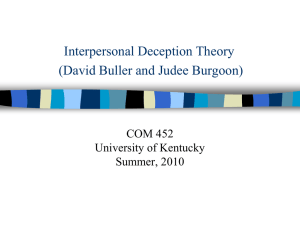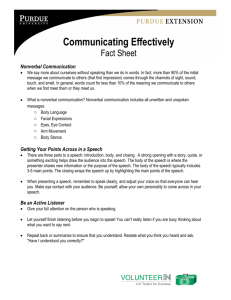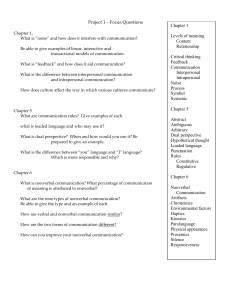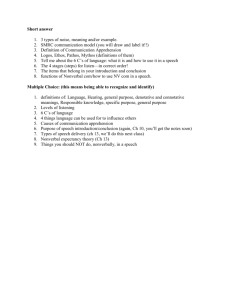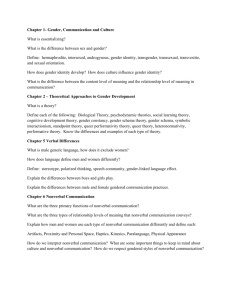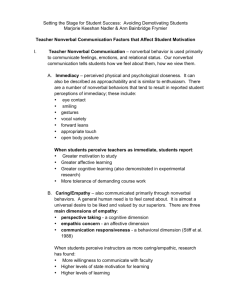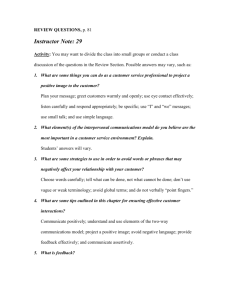Psychopathy and Deception
advertisement
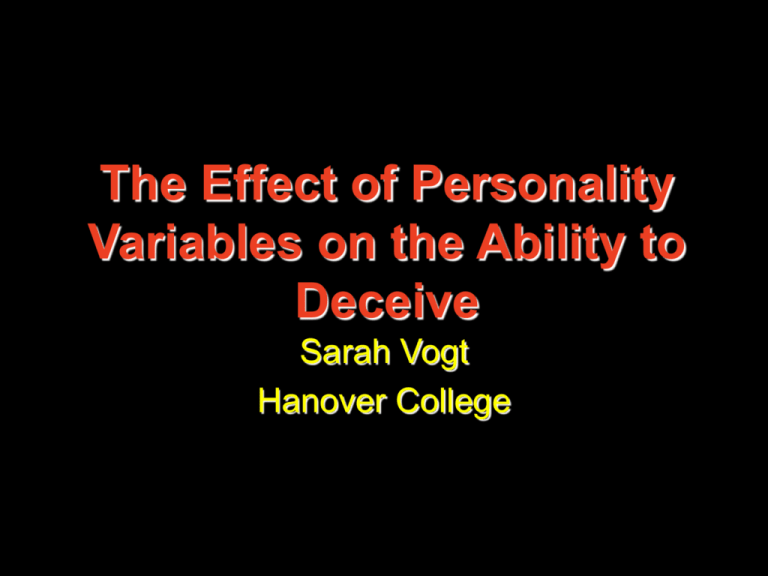
The Effect of Personality Variables on the Ability to Deceive Sarah Vogt Hanover College Research Question Are people with certain personality characteristics better able to deceive? Personality Variables: Symptoms of Psychopathy Why are they related to deception? Those with psychopathic symptoms are often compulsive liars and manipulators What is it? Robert Hare (1999): Key Symptoms of Psychopathy: – Interpersonal: superficiality and lack of empathy – Social Deviance: impulsivity and the need for excitement – Focused on symptoms instead of psychopathy as a general concept--there are many contributing personality variables Research on Deception • Ekman & Friesen (1974): suppressing anxiety when lying in one channel (e.g., voice) can cause it to “leak” through another channel (e.g., face): “nonverbal leakage”= poor deception • Female nurses saw 2 videos (1 pleasant, 1 unpleasant): told to act as if they were watching both pleasant • Result: more anxiety during unpleasant clip • Similar to my study: Method for measuring nonverbal leakage using exposure to video clips rather than lying—need reason to feel anxious Procedure Overview Expected Results • Complete questionnaire or watch clips (eliminate order effects) • Debriefing and Permission Nonverbal Leakage During Unpleasant Clips • Informed Consent 2 1.5 1 0.5 0 1 2 3 4 5 6 Psychopathy Symptoms Participants • Young men and women (N = 21), aged 18-31 • 5 men, 16 women • All were Caucasian Measuring Symptoms of Psychopathy (“Attitude Assessment”) • Based on Hare’s (1999) Psychopathy Checklist--10 symptoms measured, 3-6 questions for each symptom (Likert Scale-based) – Lack of Guilt: “When I know I have done wrong, I feel really bad inside.” (r) – Willingness to Manipulate: “I can get myself out of trouble easily and feel okay about it.” The Participant’s Task Red Dragon (unpleasant) Sideways (pleasant) • 11 video clips • Clips unpleasant (horror) and pleasant/neutral (other films). • Instructed to conceal emotion as if watching all pleasant/neutral clips (Ekman & Friesen, 1974) • Face was videotaped • Permission granted to record video and use in presentation Detecting Deception • Clips for each participant reassembled in random order • Nonverbal leakage score for each clip: – 0 = no nonverbal leakage – 1 = some nonverbal leakage – 2 = significant nonverbal leakage Measuring Deception • Measured departure from neutral/positive reaction (0, 1, 2): level of “nonverbal leakage” – Were instructed to maintain neutral/positive reaction (typical leakage = fear, disgust) • Lower overall nonverbal leakage score = hypothesized to be the better deceivers • Ran dependent t-test between ratings for pleasant and unpleasant films: very accurate at t(20) = 8.07, p = 2.17 x 10-7 Nonverbal Leakage During Unpleasant Clips Hypothesis 2 1.5 1 0.5 0 1 2 3 4 Psychopathy Symptoms 5 6 Results: Deception and Lack of Guilt Average Nonverbal Leakage During Unpleasant Clips r(21) = -0.476, p = .029 1.8 1.6 1.4 1.2 1 0.8 0.6 0.4 0.2 0 0 1 2 3 Average Lack of Guilt Score 4 5 Results: Deception and Willingness to Manipulate Average Nonverbal Leakage During Unpleasant Clips r(21) = -0.493, p =.023 1.8 1.6 1.4 1.2 1 0.8 0.6 0.4 0.2 0 0 1 2 3 4 Average Deceit/Manipulation Score 5 Other Results • All other psychopathy symptoms not correlated with nonverbal leakage: Egocentricity: r = -.04, p = .87 Superficiality: r = -.22, p = .38 Lack of empathy: r = -.32, p = .18 Impulsivity: r = -.05, p = .85 Need for excitement: r = -.30, p = .20 Lack of responsibility: r = -.18, p = .46 Early behavior problems: r = -.26, p = .28 Adult antisocial behavior: r = -.02, p = .93 Discussion/Limitations • There were personality traits related to the ability to deceive: lack of guilt and willingness to manipulate – Lack guilt (do not feel guilty when doing wrong): may be better liars because they do not feel guilty for lying, thus showing less emotion when lying – Willingness to manipulate (skilled and willing to manipulate): may be better liars because they practice it regularly • Helps explain why people we know are such good liars • More participants in May 2007 Questions?
